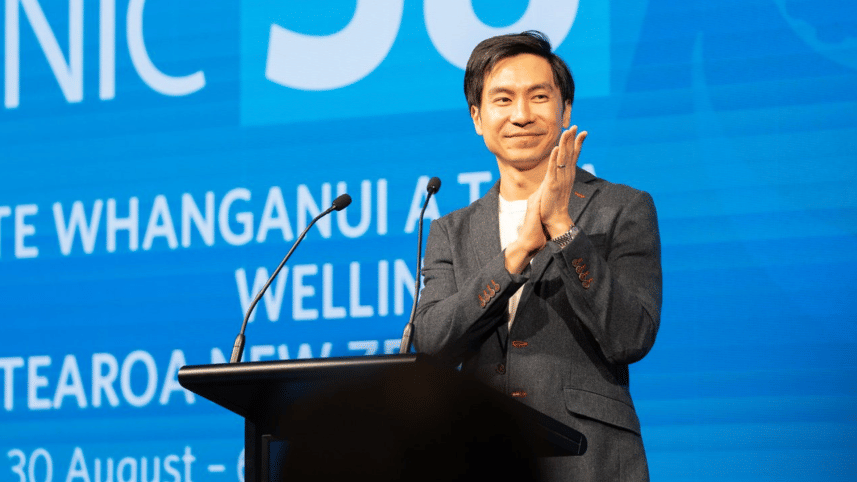Bangladesh’s internet growth ‘just the beginning’, says APNIC Chief

Jia Rong Low, the newly appointed Director General of the Asia Pacific Network Information Centre (APNIC), believes Bangladesh is on the cusp of significant digital transformation. Speaking during the APRICOT 2025 & APNIC 59 conference in Malaysia, Low outlined the country's progress and challenges in areas ranging from IPv6 deployment to policy participation and internet community engagement.
In an exclusive interview, he shared his thoughts on how Bangladesh can sustain its internet development momentum.
Q: How do you view the current state of Bangladesh's internet infrastructure and its operational community?
Bangladesh ranks second among APNIC's direct membership economies and is also the fastest-growing. This reflects a robust increase in local internet operator activity. Over the past four years, APNIC has conducted 27 training workshops in Bangladesh—a significant figure that highlights both demand and engagement. This growth contributes not only to the country's digital ecosystem but also to broader economic development. I see this as just the beginning.
Q: What is your view on participation from non-technical actors—such as policymakers and journalists—in technical events like APNIC and APRICOT?
The landscape is shifting. At ICANN, we've seen increasing engagement from policymakers. APNIC has followed a similar trajectory—transitioning from purely technical conversations to a more inclusive environment where community members with policy interests are contributing. A notable example is Shaila Sharmin from Bangladesh, co-chair of the Policy SIG. We're also seeing greater interest from regional regulators and journalists, though participation often depends on the relevance of the topic. For instance, a discussion on WHOIS policy might seem dry, but when privacy and legal frameworks enter the debate, it becomes widely engaging.
Q: With significant membership in Bangladesh, what are APNIC's regular activities for local members? How might this support evolve?
We've focused heavily on training—those 27 workshops I mentioned are part of a broader strategy. We also work with local Network Operator Groups (NOGs), providing a platform for ongoing engagement. I recently updated our strategic plan with three main pillars, one of which is creating a knowledge exchange space. This means unifying various platforms—our blog, podcast, mailing lists, and conferences—to foster more cohesive dialogue.
Our aim is to build a more vibrant, multi-stakeholder community where policymakers, startups and regulators can interact with technical experts. For Bangladesh, this means moving beyond traditional training to better support IPv6 and RPKI adoption. For example, IPv6 deployment has risen from 2% to 19%, largely driven by big players. But smaller operators lag behind. The challenge is to identify whether more training is the answer, or if other incentives or interventions are needed. We're committed to working with the community to find out.
Q: Bangladeshi members currently benefit from a discounted fee as an LDC. With graduation forecast for 2027, what's APNIC's plan regarding membership fees?
APNIC's policy grants a 50% discount for members from least developed countries (LDCs). If Bangladesh graduates from LDC status, the discount would no longer apply. This policy isn't determined by us—it's tied to UN classifications. Graduation would reflect Bangladesh's economic progress, which should be celebrated. However, we recognise that some smaller members may face challenges. In such cases, we're open to working with them on adjusted payment schedules.
Q: Are you satisfied with Bangladesh's IPv6 progress? What more can APNIC do?
The growth is encouraging, but there's a long way to go. Different economies adopt IPv6 in different ways. In India, Reliance Jio's decision to move to IPv6 created a ripple effect. In other cases, government policy plays a major role. We're ready to support in whichever way helps—be it more training, awareness for C-level executives, or policy engagement. The key is identifying which levers will move the adoption needle.
Q: Is APNIC currently engaging with the Bangladeshi government on IPv6 deployment within public organisations?
I'm planning to visit Bangladesh, hopefully during bdNOG in May, and I look forward to meeting with government officials. This engagement will help us align resources with national priorities. Governments across the region are generally supportive of IPv6, and with global adoption crossing the 50% mark this year, we have compelling data to support our advocacy. We hope to collaborate more closely with the government and other stakeholders in Bangladesh during this visit.



 For all latest news, follow The Daily Star's Google News channel.
For all latest news, follow The Daily Star's Google News channel.
Comments